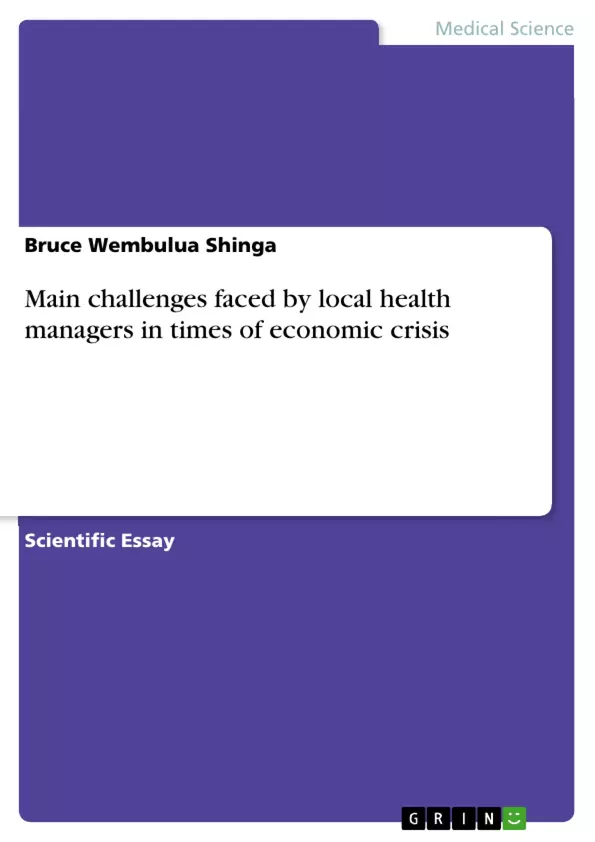This paper deals with challenges faced by local health managers in times of economic crisis, since almost nothing in our modern healthcare system is preserved from both immediate and long term effects of economic oscillations. The healthcare becomes more and more subject to higher technologies with a growing number of private, well organized and benefit-oriented hospitals. Researchers found that approximately 50% of health improvements were due to access to better technology, whereas remaining gains resulted from income improvements and better education. Healthcare is actually referenced to as one of the most complex, costly and challenged sector of our contemporary societies.
Just as health conditions at any time improve with income level, so too, might adverse income shocks have detrimental effects on health. Economic downturns have been linked to increased morbidity and mortality, and to poor nutrition and mental health. The recent economic crisis through the increasing socioeconomic disparities and difficulties such as unemployment, extreme poverty, homelessness, stigma, discrimination and social isolation and through the budgetary constraints and poor policies for financing prevention and treatment, have been translated to heightened risk behaviors on the individual level and impaired public health response on the population level.
The negative impacts can also be observed at the societal level, as all sensitive social indicators have been distorted. In European countries, the late 2000's economic crisis laid to a consistent tendency of European governments to diminish the spending on healthcare. This have led to considerable decrease in the number of people accessing healthcare as in countries with weak health insurance policy people had to use money from their pocket.
The economic crisis provokes certainly the need for multifactorial adjustments at all health managerial levels. To powerfully address this issue health managers should have clear understanding of the impacts of economic crisis on their ability to maintain and promote an adequate healthcare provision. The present paper will discuss indeed, the main challenges that a health services manager can face regarding the impact of an economic crisis to a local society.
Inhaltsverzeichnis (Table of Contents)
- INTRODUCTION
- CHAP. 1: IMPACTS OF AN ECONOMIC CRISIS TO A LOCAL SOCIETY
- CHAP. 2: MAIN MANAGERIAL CHALLENGES IN TIMES OF ECONOMIC CRISIS
- CONCLUSION
Zielsetzung und Themenschwerpunkte (Objectives and Key Themes)
This paper aims to explore the significant challenges faced by local health managers in the context of economic crises. It delves into the complexities of navigating healthcare provision amidst financial constraints and societal upheaval.
- The impact of economic crises on local communities and healthcare systems.
- The challenges faced by health managers in maintaining and promoting adequate healthcare provision during economic downturns.
- The relationship between economic stability and health outcomes.
- The role of public health programs in mitigating the negative health effects of economic crises.
- The importance of multifactorial adjustments at all health managerial levels to address the challenges of economic crisis.
Zusammenfassung der Kapitel (Chapter Summaries)
The Introduction highlights the pervasive influence of economic fluctuations on modern healthcare systems, emphasizing the increased reliance on technology and the complex challenges faced by the healthcare sector.
Chapter 1 examines the multifaceted impacts of economic crises on local societies, exploring the link between health and income, and outlining the various channels through which economic downturns can affect human health. This includes the detrimental effects of unemployment, reduced income, and diminished access to essential healthcare services.
Chapter 2 (not included) delves into the specific managerial challenges faced by local health managers in times of economic crisis.
Schlüsselwörter (Keywords)
Economic crisis, healthcare management, local health services, health outcomes, income inequality, public health programs, financial constraints, societal impacts, health policy, healthcare access.
Frequently Asked Questions
How does an economic crisis impact local healthcare?
Economic downturns lead to reduced government spending, increased unemployment, and higher socioeconomic disparities, which directly affect public health and access to services.
What are the main challenges for health managers during a crisis?
Managers must navigate budgetary constraints while maintaining quality care, dealing with increased demand for mental health services, and addressing the needs of vulnerable populations.
Is there a link between income level and health outcomes?
Yes, research shows that health improvements are often tied to income and education. Conversely, income shocks can lead to increased mortality and poor nutrition.
How did European governments respond to the late 2000s crisis?
Many European countries consistently diminished their healthcare spending, forcing citizens to pay more out-of-pocket or reducing access for those without strong insurance.
What role does technology play in modern healthcare costs?
Technology accounts for approximately 50% of health improvements but also makes the sector more complex and costly to manage.
- Arbeit zitieren
- Dr Bruce Wembulua Shinga (Autor:in), 2016, Main challenges faced by local health managers in times of economic crisis, München, GRIN Verlag, https://www.grin.com/document/349844



